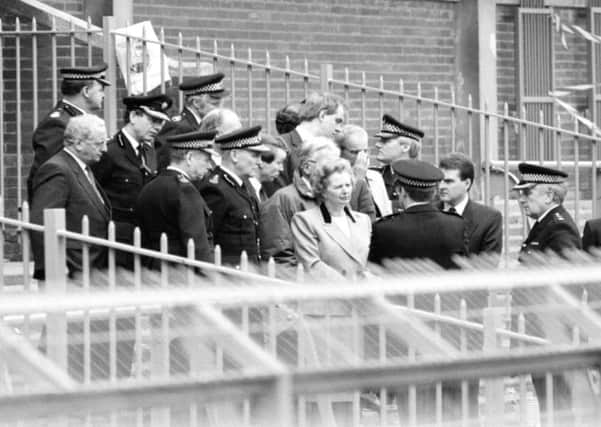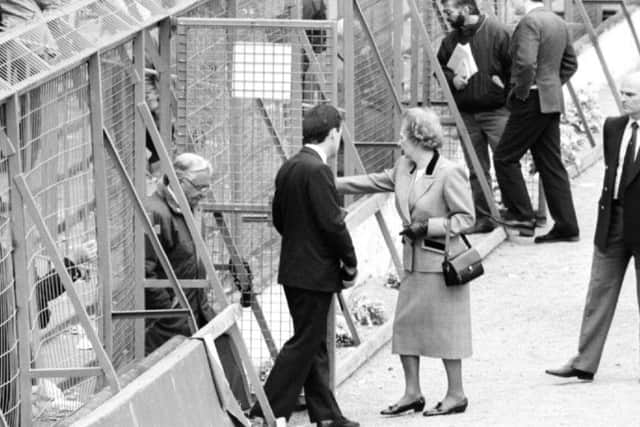Secret cabinet papers examined in probe into Hillsborough '˜cover-up'


The Independent Police Complaints Commission has taken statements from around 20 politicians - along with over 120 journalists - as part of the ongoing probe, which is ‘by far the biggest investigation’ it has ever conducted.
Rachel Cerfontyne, deputy chair of the IPCC, said the investigation has included access to Government papers that had not previously been made public.


Advertisement
Hide AdAdvertisement
Hide AdOne of the key strands of the IPCC investigation is examining allegations that deliberately misleading information was passed to the media, MPs and Parliament as part of efforts to deflect the blame for the disaster from the police on to Liverpool supporters.
Included in the probe is an examination of the origin of The Sun newspaper’s ‘The Truth’ article, which had claimed supporters were urinating on the bodies of the dead and attacking police officers helping victims.
It quoted a ‘high-ranking’ police officer as saying the fans had been ‘acting like animals’.
Ms Cerfontyne said: “We are looking at whether the police were attempting to blame the fans and make allegations about the fans to deflect blame from them.


Advertisement
Hide AdAdvertisement
Hide Ad“What we are focusing on is around the cover-up allegations. That goes to the heart of trust and confidence in policing.”
Ms Cerfontyne added: “It is highly important people remember that the inquests are not the end of the process, they are another very important stage in the Hillsborough journey.
“Our investigative work will result in files being supplied to the CPS for them to make charging decisions.”
The depth of the IPCC investigation has included recovering 5,200 police notebooks - some locked away in garden sheds and lofts and even water-damaged and covered in rat droppings, while a 1980s computer has been acquired to read floppy disks containing relevant information.
Advertisement
Hide AdAdvertisement
Hide AdOffences under investigation by the IPCC include conspiracy to pervert the course of justice, perverting the course of justice, perjury and misconduct in a public office.
Over 220 staff have been working on the investigation, which has included 7,000 exhibits being seized, over 400 statements taken from police officers and pursuing more than 10,000 lines of enquiry.
The IPCC are investigating over 140 complaints from families of those that died and survivors of the disaster.
As part of the probe into an alleged cover-up, the IPCC is considering 260 accounts from police officers ‘which appear to have been amended in some way’.
Advertisement
Hide AdAdvertisement
Hide AdThe amendments are said to range from minor typing errors to ‘the removal of evidence’.
A spokesman said: “Extensive analytical work has been undertaken by our investigative team and intelligence unit to try and determine what changes were made, why they were made and who instructed them,.
“This is a complex piece of work but through it we believe we have a good understanding of the amendment process.”
The probe is also looking at why blood alcohol tests were conducted on 95 of the supporters who died - along with people who were injured.
Advertisement
Hide AdAdvertisement
Hide AdThe IPCC said: “This line of enquiry is looking to establish whether the testing was part of established processes or whether, as alleged, it was the result of an attempt by South Yorkshire Police to create a narrative around drunken supporters.”
Also under investigation is why checks were made on the Police National Computer about some of those that died and were injured.
Allegations as to whether members of the South Yorkshire Police may have been Masons and whether that impacted on decision-making in the aftermath of the disaster are also being examined.
The work of the IPCC has included examining records of Freemasons’ meetings that took place after Hillsborough ‘to assess whether there may be some correlation with individuals involved in decision-making around Hillsborough’.
Advertisement
Hide AdAdvertisement
Hide AdThe IPCC has also looked at allegations that Hillsborough families and campaigners were put under police surveillance in the years following the disaster.
But the IPCC has admitted some complaints relating to phones being tapped ‘could not be fully investigated due to the law preventing information about even the existence of any authorisation for telephone intercepts being made available to the IPCC’.
While many lines of inquiry have already been completed, Ms Cerfontyne said information about the IPCC’s findings would only be released once all areas of investigation are concluded.
‘Extensive investigations’ have also taken place into the conduct of West Midlands Police, who were tasked with gathering evidence for the Taylor inquiry, the original inquest and the criminal investigation.
The IPCC said that element of its work has included examining their relationship with South Yorkshire Police and whether ‘any form of influence’ was place on original coroner Stefan Popper.